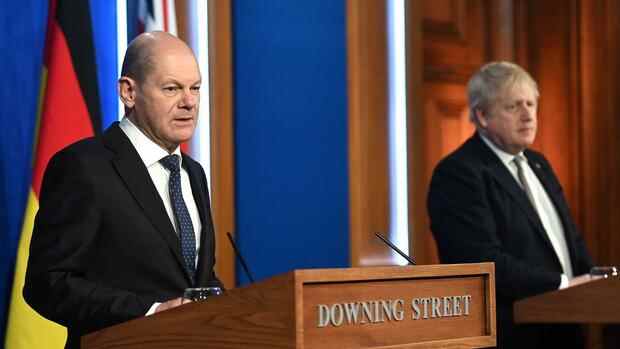Scholz on German aid in the Ukraine war: “We are doing everything we can. And that’s a lot.”
(Photo: Bloomberg)
London Germany and Great Britain want to jointly increase the pressure on Russian President Vladimir Putin. At the same time, their unity is not jeopardized by unresolved Brexit problems. That is the most important finding of Chancellor Olaf Scholz’s inaugural visit to London.
“Our friendship has become even more important in light of the Russian attack on Ukraine,” British Prime Minister Boris Johnson said at the joint press conference at 10 Downing Street. Scholz announced the first joint cabinet meeting between the governments in London and Berlin at the beginning of next year.
Both heads of government were trying to put the dispute over Britain’s exit from the EU behind them. “The Europe we knew six weeks ago no longer exists,” Johnson said. His government will work closely with EU partners on economic sanctions against Russia and arms deliveries to Ukraine.
The Brit announced that London would provide a further £100m for additional arms. The Federal Chancellor also promised further military aid, but did not want to comment specifically on deliveries of the “Marder” infantry fighting vehicle.
Top jobs of the day
Find the best jobs now and
be notified by email.
Scholz and Johnson condemned the rocket attack on a train station in the eastern Ukrainian city of Kramatorsk, which Ukrainian sources say killed more than 30 people. Both spoke of war crimes and held Putin directly responsible for them.
Scholz: The infrastructure for the gas embargo still has to be created
Asked if Germany didn’t have to do more in the face of Russian aggression, Scholz said: “We’re doing everything we can. And that’s a lot.” He pointed out that Germany will say goodbye to coal and oil supplies from Russia this year. For a gas embargo, however, the necessary infrastructure would first have to be created. In addition, thanks to Western sanctions, Putin cannot use the income from energy sales at all.
Johnson said he last spoke to the Russian president before the invasion. At the moment he sees no point in further talks. “One cannot trust Putin,” said the British prime minister. Scholz defended French President Emmanuel Macron’s contacts with Putin. However, he stressed that only the Ukrainians themselves could decide their fate. Macron had been heavily criticized by Polish Prime Minister Mateusz Morawiecki for his phone calls with the Kremlin boss and then described the Pole in an interview as a “right-wing anti-Semite”.
The Brexit conflict only shone through briefly.
(Photo: Bloomberg)
At the end of Scholz’s visit to London, the old Brexit conflict still shimmered through under the demonstrated harmony: When asked whether he now ruled out the suspension of the controversial Northern Ireland Protocol, Johnson replied: He didn’t want to disturb the harmonious mood, but the notorious article 16 of the withdrawal agreement is not off the table. The British want to reserve the right to unilaterally terminate the contractually agreed border controls between the Northern Irish province and the rest of Great Britain.
More: The war in Ukraine puts Brexit in a new light
